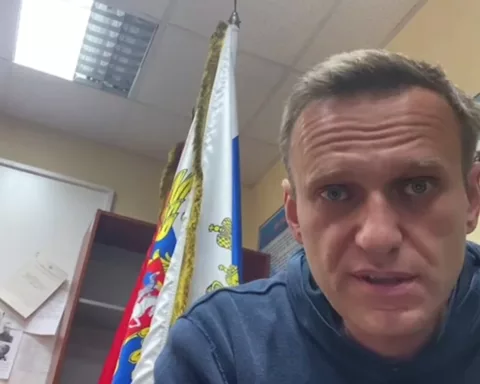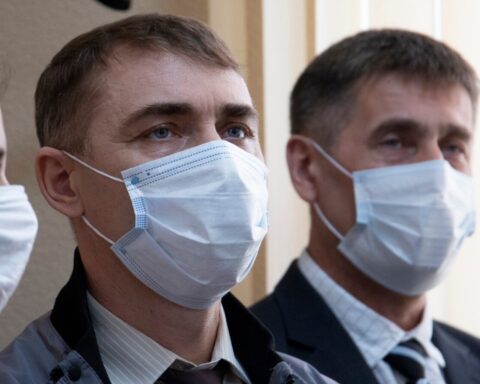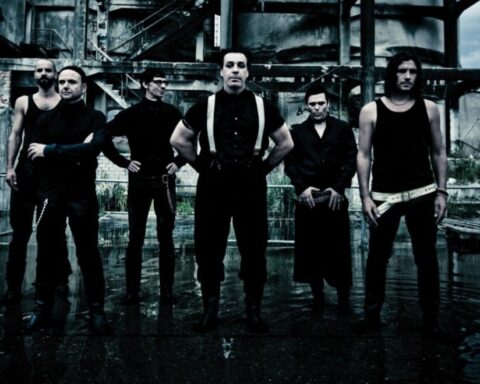On April 19, imprisoned Russian opposition leader Aleksei Navalny testified by video link in the case of Lilia Chanysheva, the former head of Navalny’s office in Bashkortostan, who is being tried in the regional capital, Ufa, for allegedly “creating and leading an extremist organization.”
For a few moments before the hearing opened, Chanysheva and Navalny were able to speak directly. When Chanysheva asked how Navalny was holding up after numerous stints in solitary confinement and other harassment he has said amounts to torture, Navalny brushed her off.
“Don’t think about me,” Navalny said. “Think about the beautiful Russia of the future that we will achieve. Thanks to you and people like you, we will do this. You are a rock. I never doubted you, not for one second…. I am so happy I know you.”
“You have inspired a huge number of people, particularly women,” Navalny continued. “Everything will be OK.”

Despite such assurances, Chanysheva is realistic about her closed-door trial and the prison term of up to 18 years that could lie ahead of her.
“Since in Russia about 99.9 percent of cases end in conviction, I don’t expect mine to be any exception,” she said in an interview from jail with RFE/RL’s Idel.Realities. “I hope I will be released before the term they give me ends and that all those who are guilty of my illegal imprisonment will be held responsible under the Criminal Code of the Russian Federation.”
RFE/RL was able to send written questions to Chanysheva and receive her responses through her lawyers.
‘So The Public Wouldn’t See’
Chanysheva, 41, was arrested in Ufa on November 10, 2021. She was transferred to a pretrial detention jail in Moscow, where she was held for 453 days while the case against her was being assembled. Her case was originally investigated together with those of Navalny and his top colleagues, including Leonid Volkov, Ivan Zhdanov, and Lyubov Sobol. Later, Chanysheva was sent back to Ufa to be tried separately. In June 2021, President Vladimir Putin’s government shut down Navalny’s Anticorruption Foundation and his network of regional offices after designating them “extremist organizations.”
Chanysheva denies the accusations against her.

In December 2021, the banned human rights organization Memorial added her to its list of political prisoners in Russia.
In her comments to RFE/RL, Chanysheva described the case against her as “not only political, but actually absurd.” Her trial is being held behind closed doors on the recommendation of the regional branch of the National Anti-Antiterrorism Committee, which told the court the trial would be covered “negatively” on the Internet, with calls for public demonstrations intended to intimidate the court and witnesses.
“I believe they closed the trial so the media and the public wouldn’t see the absurdity of the accusations or the absence of any evidence,” she said.
At a court session on March 22, one witness said in court that investigators had pressured her to testify against Chanysheva and tried to recruit her as an informant, Chanysheva’s lawyer, Sergei Makarenko, said.
The witness, whose identity RFE/RL chose not to disclose, said she was “ashamed” to testify.

“I am just horrified that I was even summoned to the trial,” the witness told RFE/RL. “I thought that I would manage to avoid that disgrace. I consider it torture of my conscience…. I know her as a decent person, and certainly I said at the trial that I consider the charges against her to be without grounds.”
Some of the witnesses against her, Chanysheva said, were former Navalny staffers from other regions of Russia whom she did not know previously.
“I think they were told that if they don’t admit to extremism in the activity of the offices, then they would get the same treatment as me: first held in custody and then given a long prison term,” she said. “I don’t believe these people were testifying sincerely.”
Flowers Through The Bars
Chanysheva said she is being held alone in a cell without hot water but with a television constantly showing the state channels. She must sit in a cage during her meetings with her lawyers, she said. But she tries to look on the bright side.
“The exercise yard is almost completely open to the sky, so you can see sky and sun,” she said. “You can get some sun or walk in the fresh snow in the winter. In Moscow, there was a cover…so that all year you walked around in shade, often with artificial light.”

“In the meeting rooms, the windows aren’t painted over,” she added, “and in the corridors of the women’s wing you can see Ufa through the windows. In Moscow, the windows were way up by the ceiling, and you couldn’t see anything.”
On March 23, Chanysheva was allowed a one-hour visit from her husband, Almaz Gatin.
“One year, four months, and 10 days after Putin and his ilk separated me from my loved ones,” she wrote on Telegram the same day, “we spoke by telephone through glass and bars…. In Moscow, visits last two or three hours, but in Ufa, it is strictly just one…. But I am happy! I was able to talk to a strong, wise, and loving man, my husband, for an hour. Love one another and treasure every hour that you are together.”
Since then, she has been allowed to see her brother and parents as well. Her parents, she said, came together and had to share one telephone receiver.
“My husband and brother brought flowers,” she recalled. “Although they were not allowed to give them to me, it was nice to see them.”
‘I Believe In People’
Russia’s unprovoked invasion of Ukraine in February 2022, Chanysheva said, has ushered in “an era of hatred, not only toward Ukrainians but toward one’s own people.”

“It is an era of the destruction of our country for the sake of the personal ambitions of a few powerful people in government,” she said. “And I think it will continue at least until the war in Ukraine is ended.”
The war, she added, causes her “shame, pain, anger, and sadness.”
“I think we have an even more difficult future ahead of us than we had before all these events,” she said. “I also think the guilty will be held legally accountable. Russia is not North Korea, and the Soviet Union is not coming back. The world has changed, and a new generation is coming up in our country. They can’t keep everyone afraid forever.”
“No matter what,” she added, “I believe in people. Even more now than a year ago.”
Robert Coalson





